For years, Nigeria has depended on foreign help to support important services like health care, education, nutrition, and child protection. One of the biggest sources of this help was the United States Agency for International Development (USAID), which supported millions of people, especially in the North-East region.
Between 2001 and 2024, USAID spent an average of $23 billion every year worldwide, helping to prevent over 91 million deaths. States like Borno, Adamawa, and Yobe—known as the BAY states—benefited greatly from these humanitarian efforts.
But things have changed.
With the return of Donald Trump to the White House in what many are calling “Trump 2.0,” USAID is no longer what it used to be. Reports show that the new U.S. government has stopped 83% of USAID projects and plans to transfer the agency’s roles to the U.S. State Department. Though Congress has not officially shut it down, the agency is already inactive.
This decision has hit Nigeria hard, especially the BAY states. The big question now is: what next?
Nigeria cannot afford to blame others or remain angry. The truth is that 64 years after independence, it is sad that basic public services in some states still depend so much on foreign donors. When the money stops, vaccinations, school enrolments, and protection services also stop. This is not sustainable.
Governor Mai Mala Buni of Yobe State recently directed officials to study the situation and protect whatever humanitarian progress has been made so far. But studies alone cannot solve the problems. If nothing is done urgently, more children will drop out of school, diseases will spread in IDP camps, and many people will suffer.
Yobe State—and indeed the whole country—must now take action. Leaders must make tough decisions. They must shift money from big infrastructure projects to more important things like health, education, and protection of vulnerable people. Even if roads and buildings must wait, the lives of citizens must come first.
The federal government must also do its part. Emergency funds should be released quickly. National social protection programmes must be expanded. Most importantly, the states that relied heavily on USAID and other donors should receive direct support.
But money alone is not enough.
For many years, local NGOs and community-based organisations in Nigeria only acted as helpers to international organisations. They did not grow strong enough to run things on their own. This must now change. These groups must be trained, funded, and trusted to lead important programmes by themselves.
Nigeria must also look beyond the West. There are other sources of support such as African regional funds, the Islamic Development Bank, and even local private companies. These can help in areas like clean water, food, and low-cost education. Relying on only a few big donors is too risky.
What is happening in Yobe is a warning to the whole country. The State Emergency Management Agency (SEMA) has already reported that thousands of people in places like Damaturu, Potiskum, Fika, and Yusufari have lost access to basic services. These are not just statistics—they are real people who are now more vulnerable because of decisions made far away in Washington.
This is the time for Nigeria to decide: do we continue waiting for foreign donors, or do we build our own systems to take care of our people?
USAID’s exit was not Nigeria’s fault. But our response to this situation is 100% in our hands. If we treat this like a temporary problem, we will keep falling into the same trap. But if we use this opportunity to invest in strong local solutions, we can build a future where Nigerians do not have to depend on others to survive.
